- Home
- Muriel Jensen
Always Florence
Always Florence Read online
Not even love can keep her from her dream
Bobbie Molloy’s dream to paint in Florence gave her the strength to battle cancer. Now that she’s recovering, and just weeks away from leaving for Italy, she won’t let anything—or anyone—stop her from making that dream come true. Not even Nate Raleigh.
From the moment he rushes in to save what’s left of her studio—after his young nephews had inadvertently trashed it—next-door neighbor Nate has Bobbie intrigued. Everything about him is complex and endearing: two excellent reasons to keep her distance. She can’t risk getting involved when she’s just passing through. Her dream has kept her alive and it has to come first. No matter what the cost.
He’s gorgeous.
Bobbie could have thoughts like this with the comfortable distance of a woman who didn’t really care. Now that much of the mess was cleaned up and she felt calmer, she could observe Nate with detached interest. Tall, lean, hazel eyes with stubby lashes, nice nose, Saturday-morning stubble around a straight mouth that was a little tight. He didn’t smile much. She was willing to bet he had a dynamite smile when he used it.
She wondered what had happened that his nephews were living with him. He seemed to be good with them, although she sensed an undercurrent of antagonism from the older boy.
She could list Nate’s qualities without a stirring of feminine interest because she had a life plan that didn’t involve a husband and children. She was going to Florence, Italy, to study art. It had been a dream since she was sixteen, and the past year had turned it into an obsession. She was in remission, but she didn’t have forever. She had to go now. The need to make art lived inside her, trying to break out, and she had to follow the masters to study and learn. To find the depths of her talent.
Bobbie watched the three walk across the yard to the big yellow house next door, the man and one of the boys hand in hand, the dog lumbering along beside them. She smiled at the sight.
Nice, but not for her.
Dear Reader,
Hello, again! I’m thrilled to be back at Harlequin. Life took me away for some time, but I’m delighted to return with a book to offer you.
My younger sister, Diane, is a cancer survivor. I thought her very heroic in her battle and when I was asked to come up with an idea for a Harlequin Heartwarming book, her struggle came to mind. Combining her experience with my husband, Ron’s, career as an artist was an easy leap. My hero’s work as a CPA comes from my last seven years as a receptionist in an accounting firm.
So, my heroine wants to travel to Florence to learn about the artist inside her, and my hero has custody of his two little nephews and a business and must stay home. What to do?
Love, of course, will find a solution.
Best wishes to you!
Muriel Jensen
Muriel Jensen
Always Florence
MURIEL JENSEN
Muriel Jensen and her husband, Ron, live in an old foursquare Victorian looking down on the Columbia River in Astoria, Oregon. They share their home with Cheyenne, a neurotic husky mix, a tabby hoard (there are only two, but they seem like more) and Rosie, a stray cat who’s been coming and going for years and still doesn’t trust them. Muriel says she helps keep alive those complicated inner workings of a mind dealing with a troubled past that is the source of all good plotting!
They have three children, eight grandchildren, four great-grandchildren and a collection of the most interesting and generous friends and neighbors. They feel truly blessed!
To Mike and Suzanne, and the staff at WWC Business Solutions, who kept me employed (and fed!) and Jim Defeo and Tony Danton and the staff at the Astoria Coffee House who provided a port in the storm while my leg was broken.
Contents
CHAPTER ONE
CHAPTER TWO
CHAPTER THREE
CHAPTER FOUR
CHAPTER FIVE
CHAPTER SIX
CHAPTER SEVEN
CHAPTER EIGHT
CHAPTER NINE
CHAPTER TEN
CHAPTER ELEVEN
CHAPTER TWELVE
CHAPTER THIRTEEN
CHAPTER FOURTEEN
CHAPTER FIFTEEN
EPILOGUE
CHAPTER ONE
“WHAT’S SHE DOING?” Sheamus Raleigh, seven years old, hid with his brother behind a balding rhododendron and watched the woman at work in the garage next to theirs on the shared double driveway.
Dylan, ten, was a little mystified by the very large pot at her feet and the big stick she used to stir whatever was inside. He’d wondered about her since she’d moved in last month, but Uncle Nate said she seemed to want to keep to herself. Sometimes she smiled at them if they were getting into their cars at the same time, but she never spoke or waited to see if they wanted to. His uncle said they’d skip her house when they went trick-or-treating next week. That she had a right to be private if she wanted to.
So they didn’t know why she always wore baggy black clothes and a woolly hat. Or why she always worked in the garage with the door open and kept the car in the driveway. There were strange noises when she worked, and she chanted. Whatever she was doing was probably just weird and not bad, but the chance to mess with Sheamus was too good to pass up.
“That’s a cauldron,” Dylan said, in the knowledgeable tone he used to let his little brother know he was still in charge. He didn’t really feel that way anymore. Nothing was the way it used to be. Their parents were gone. Their uncle, who used to be so cool, now made their lives miserable. And worst of all, Dylan didn’t seem to know things anymore. Before the accident, he’d started to feel he was beginning to understand how being with people worked. Then his parents had died, and now his life was like a big black hole. Unless he was working on one of his experiments, or making Sheamus cry.
His brother deserved to cry. He was afraid of everything. And it wasn’t a world for sissies.
“What’s a cauldron?” Sheamus whispered. He put an arm around Arnold, their uncle’s apricot mastiff mix, who went everywhere with them. They weren’t supposed to be in the neighbor’s yard, but Dylan didn’t care about that. His uncle was always mad at him. Well, not mad exactly, but he acted as if he didn’t understand him. And that was dumb. Adults were supposed to understand kids.
Dylan made a big circle with his arms. “One of those pots witches use to make potions and things.”
Sheamus’s blue eyes were huge. “You mean like on the card Stella gave us? With the bugs and bat wings going into the witch’s pot?”
“Yeah. Just like that. Only this lady’s probably got kid parts in there, too.”
Sheamus’s eyes got wider. “What kids?”
“I don’t know. Kids she kidnapped and locked in her house.”
Sheamus stood up, getting panicky. Arnold got up with him. Dylan’s plan was starting to work. He felt a twinge of guilt, but it was easy to get past that. Sheamus had blond hair like their mom and his eyes were the same color hers had been. It was easy to hate him.
He yanked his brother back down again. Arnold stood poised for action. “It’s all right. She won’t want you. Only brave kids go into the pot, because the potions are to make big things happen. Like explosions and lightning. It doesn’t work with fraidy kids.”
Sheamus’s eyes brimmed with tears and his lip quivered. Dylan knew his brother was curious to know what the woman was doing, but too afraid to find out. He pointed to the big bush at the edge of the driveway, very near the garage. “Let’s go get a closer look.”
<
br /> “No!” Sheamus tried to grab his arm, but Dylan shook him off. He waited until the woman leaned the stirring stick against the pot and turned to get a glass of something red from a shelf behind her. Then he covered the distance in a military crouch.
Unfortunately, at the same moment a big orange cat leaped onto the shelf near the woman’s drink. Uncle Nate said mastiffs were usually lazy, but Arnold was half Labrador retriever, and Labs never missed an opportunity to cause trouble.
Arnold leaped for the cat with an excited bark. The woman fell back against the shelf and screamed. The red drink flew, the cat screeched and the sound of tumbling lumber filled the air as woman and shelf crumpled together. Dylan heard Sheamus run for the house, yelling for their uncle.
He should have run, too, but he was stunned by how much destruction that one leap had caused. Before he could plot his escape, he was hauled to his feet by a hand that wasn’t much bigger than his, but very strong. The hat had come off the woman’s head and the red stuff was running down her face. She had brown eyes that looked mad.
Great. He was probably facing another night without his Game Boy when his uncle heard about this.
* * *
NATE RALEIGH PACKED the dishwasher and thought back to what Saturday mornings used to be like, back in the Portland Pearl District. Actually, he’d slept through them, because Friday nights had been all about dating and the Brody Theater, dinner at the Park Kitchen and friends going back with him to his condo looking over the river.
Saturdays hadn’t begun for him until lunch at the Dovetail Bakery with a client who had some payroll or accounting issue that couldn’t wait until Monday. He’d prided himself on being able to resolve them, or if not, he’d mull over possible solutions with his brother. Ben always had an answer.
God, Nate missed him. And not just as a partner at Raleigh and Raleigh Accounting Services. Mostly he wished his brother was here to tell him how to deal with his boys....
Ben had been two years older than Nate and the kind of kid, and then man, who seemed to know instinctively what to do about everything. Of course, it had been more than instinct. In school, he’d studied all the time and done extra work because he found everything about accounting and finance exciting.
As an adult, his gift in the field had taken their small tax-return business in a strip mall to the fourth floor of an elegant downtown Portland office complex, where they offered a multitude of accounting and estate planning services. They eventually opened an Astoria office on the Columbia River and two more down the coast.
Pain stabbed at Nate. As an anniversary gift, he’d given Ben and Sherrie the charter fishing excursion that had ultimately taken their lives. Guilt, combined with a terrible loneliness and a dark anger he couldn’t shake, were braided into a sort of barbed-wire band around his chest.
He had to fight his way through every day. He usually managed to put the pain and loneliness aside, but the anger was always there. That was the hardest to deal with. He’d been the cheerful Raleigh, the charmer, the one who saw the upside of life.
Now he was mad all the time. He understood the source of his anger, but seemed powerless to overcome it. He was mad at Ben for dying, mad at himself for having given him a gift that placed him in harm’s way and not knowing how to cope with that, and mad at the boys because they reminded him of Ben and him all those years ago.
He was able to live day to day without yelling at everyone, but suppressing the inclination was exhausting. He didn’t know what to do about it, so he just kept going—sad, mad and, much as he hated to admit it, a little lost.
Nate added soap to the dishwasher, let the door close with a slam, and set the dial. “Suck it up, buttercup,” he told himself.
Saturday nights, he recalled, continuing to torture himself, had pretty much been the same as Fridays, but Sundays had been about football at Fernhill Park, then pizza and beer at Mississippi Pizza.
Now, Stella Bristol prepared most of their meals. She was Hunter Bristol’s mother. Hunter had helped run the Astoria office of Raleigh and Raleigh with Ben before Nate had given Ben and Sherrie the charter boat trip to celebrate their thirteenth wedding anniversary. They’d met aboard a similar boat fifteen years previously. Nate had volunteered to stay with the boys so that his brother and sister-in-law could enjoy a romantic dinner and watch the sunrise as they’d done the night they met.
Instead, a sudden squall and the captain’s belated decision to return to port had resulted in the loss of the boat and everyone aboard. One of the witnesses to the sinking had said that Ben dived under the boat over and over, presumably in search of Sherrie, and finally just didn’t come up again.
Nate stayed with the boys in their home and took his brother’s place in the Astoria office. And the life he’d known was gone forever.
That was all right. He knew his nephews had lost far more than he had, but the life he’d led had not prepared him for the life he’d inherited.
The accident happened to coincide with Stella’s recovery from hip replacement surgery, and a desire to find useful work. She had no nanny experience, but she’d kept house and raised children. Nate figured that qualified her.
He just wished he felt more comfortable in his position as stand-in father. He’d gotten along so well with the boys when he’d simply been their uncle. Now that he had to make rules, they didn’t like him. Stella reminded him over and over that parenthood wasn’t a popularity contest, but he could see grief in their young eyes and hated the knowledge that he seemed to exaggerate it rather than relieve it. He strove to keep the anger he struggled with himself out of his voice and his touch, but in the end the boys had their own anger issues to deal with.
He awoke every morning determined to do better that day. Usually, he was shot down by 10:00 a.m. Either he got in the way of one of Dylan’s MythBusters-wannabe experiments that was eventually going to kill them all, or Sheamus burst into tears because Nate sent him back upstairs to get his jacket before letting him out to play. Sheamus was convinced there was a monster in his bedroom closet.
They’d at least reached a temporary solution for the monster issue by putting Sheamus’s jacket in the downstairs closet.
Nate picked up toy cars and trucks off the living room floor and was about to put them in a big wooden box next to the fireplace when he heard Sheamus’s shrill shout: “Uncle Na-a-ate!”
It had taken Nate a month in his role as guardian to realize that the boys’ bloodcurdling shouts didn’t necessarily mean death or dismemberment. They might just want a banana or a pudding pop. So he dropped the toy vehicles carefully into the box and was heading for the kitchen when the door burst open and Sheamus appeared. His blond hair stood up in spikes. His blue eyes were filled with terror.
He pointed a grimy finger in the direction of the backyard. “The witch’s got them!” he said breathlessly, his bony chest heaving under his Seattle Mariners sweatshirt. To add emphasis, he grabbed Nate’s arm and pulled him toward the door. “Hurry!”
“What witch?” Nate drew Sheamus back to him, then got down on one knee. “And got who?”
“The witch next door! Dylan and Arnold! She’s not just a lady, she’s a witch! And she’s stirring a pot with bat wings and spiders and feet from little kids!”
Nate felt a familiar exasperation at his younger nephew’s never-ending terrors. A four-letter word sprang to his lips, but his one success since moving in with the boys was that he’d cleaned up his language.
He caught the weeping seven-year-old by the hand, slapped the back door open and headed across the yard, ready to put an end to this latest fear.
“See!” Sheamus pointed to the little tableau near their neighbor’s garage. The woman, who never spoke to anyone, had Dylan by the arm and was leaning over him, her expression angry.
Nate stopped Sheamus at the edge of their property, dropped his han
d and told him not to move, then covered the distance to Dylan and their neighbor in three long strides. He circled the woman’s wrist with his thumb and forefinger, pulled her hand from Dylan and moved the boy behind him.
“Is there a problem?” He tried to sound reasonable, but Dylan looked worried and Nate’s protective instincts flared.
The woman looked up at him in surprise and opened her mouth to speak. No sound came out for a moment, giving him time to study her. She’d been an enigma for the four weeks she’d been here.
She was usually dressed in a baggy black sweatshirt over skinny black pants, and he hadn’t realized until now how slight she was, how pale. It was the first time he’d seen her without a hat pulled down to her eyebrows. Her hair was very short, very dark and all tight little curls. Something red and sticky covered her face, but the overall impression she made was one of fragility.
This was the first time he’d been close enough to look into her eyes. They were wide and brown, with a whole range of emotions he no longer felt qualified to analyze. He’d once prided himself on a respectable knowledge of women, but he hadn’t spent much time with any since he’d moved in with the boys. And he was angry about everything, anyway. As he recalled, women preferred good-natured men.
He did think he saw fear in her velvety gaze, and realizing he still held her wrist in a firm grip, he let it drop. Whatever had happened, he’d be willing to bet his season tickets to the Timbers that it was Dylan’s fault. He handed her a tissue from the wad he’d started keeping in his pocket. “I’m sorry,” he said. “What’s the problem here?”
* * *
BOBBIE MOLLOY ACCEPTED the tissue with a grudging “thank you” and a scolding glance at the dark-haired boy. “It’s not a problem, exactly.” As she wiped her face, her fingertips brushed the fine hair on her head. She looked around for her hat and found it on the ground, covered in grass and raspberry-hibiscus tea. She tossed it at a small table—the only thing nearby that hadn’t been overturned.

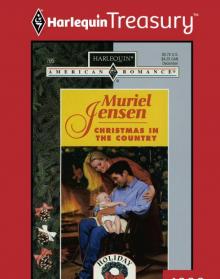 Christmas In The Country
Christmas In The Country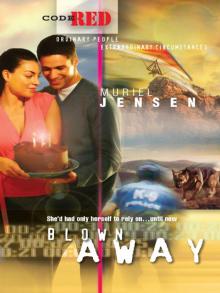 Blown Away
Blown Away In My Dreams
In My Dreams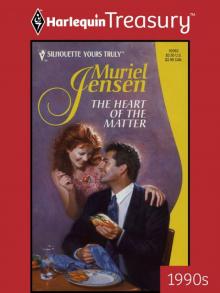 The Heart of the Matter
The Heart of the Matter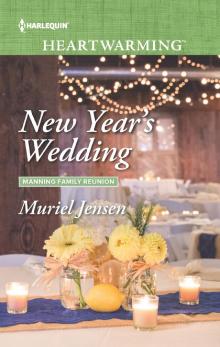 New Year's Wedding
New Year's Wedding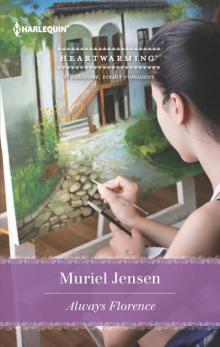 Always Florence
Always Florence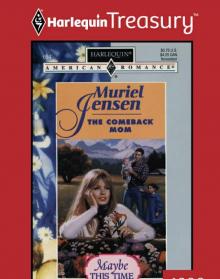 The Comeback Mom
The Comeback Mom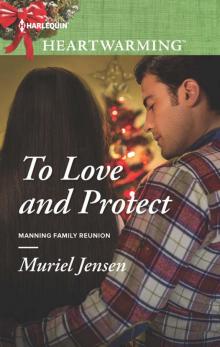 To Love and Protect
To Love and Protect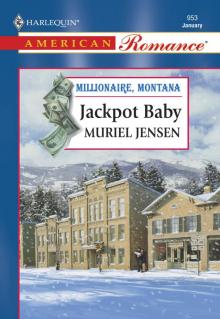 Jackpot Baby
Jackpot Baby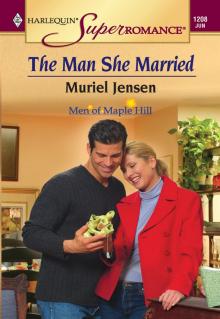 The Man She Married
The Man She Married Love Me Forever
Love Me Forever